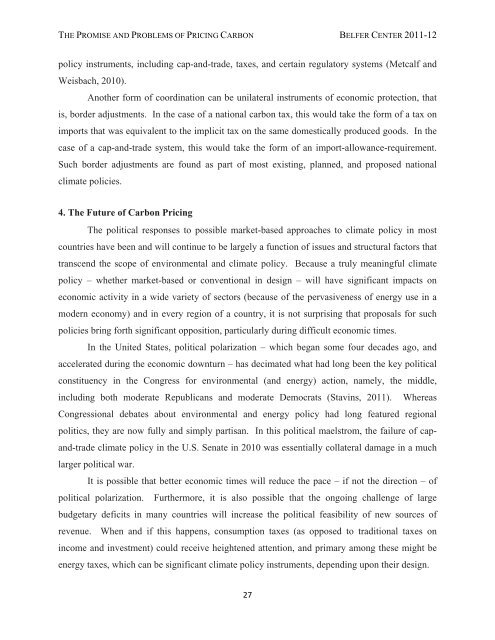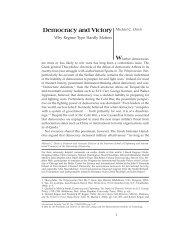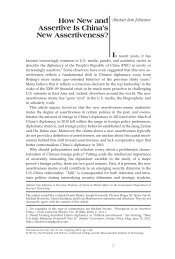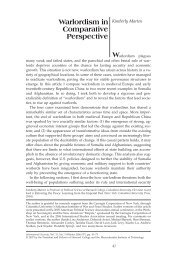The Promise and Problems of Pricing Carbon: - Belfer Center for ...
The Promise and Problems of Pricing Carbon: - Belfer Center for ...
The Promise and Problems of Pricing Carbon: - Belfer Center for ...
You also want an ePaper? Increase the reach of your titles
YUMPU automatically turns print PDFs into web optimized ePapers that Google loves.
THE PROMISE AND PROBLEMS OF PRICING CARBON BELFER CENTER 2011-12<br />
policy instruments, including cap-<strong>and</strong>-trade, taxes, <strong>and</strong> certain regulatory systems (Metcalf <strong>and</strong><br />
Weisbach, 2010).<br />
Another <strong>for</strong>m <strong>of</strong> coordination can be unilateral instruments <strong>of</strong> economic protection, that<br />
is, border adjustments. In the case <strong>of</strong> a national carbon tax, this would take the <strong>for</strong>m <strong>of</strong> a tax on<br />
imports that was equivalent to the implicit tax on the same domestically produced goods. In the<br />
case <strong>of</strong> a cap-<strong>and</strong>-trade system, this would take the <strong>for</strong>m <strong>of</strong> an import-allowance-requirement.<br />
Such border adjustments are found as part <strong>of</strong> most existing, planned, <strong>and</strong> proposed national<br />
climate policies.<br />
4. <strong>The</strong> Future <strong>of</strong> <strong>Carbon</strong> <strong>Pricing</strong><br />
<strong>The</strong> political responses to possible market-based approaches to climate policy in most<br />
countries have been <strong>and</strong> will continue to be largely a function <strong>of</strong> issues <strong>and</strong> structural factors that<br />
transcend the scope <strong>of</strong> environmental <strong>and</strong> climate policy. Because a truly meaningful climate<br />
policy – whether market-based or conventional in design – will have significant impacts on<br />
economic activity in a wide variety <strong>of</strong> sectors (because <strong>of</strong> the pervasiveness <strong>of</strong> energy use in a<br />
modern economy) <strong>and</strong> in every region <strong>of</strong> a country, it is not surprising that proposals <strong>for</strong> such<br />
policies bring <strong>for</strong>th significant opposition, particularly during difficult economic times.<br />
In the United States, political polarization – which began some four decades ago, <strong>and</strong><br />
accelerated during the economic downturn – has decimated what had long been the key political<br />
constituency in the Congress <strong>for</strong> environmental (<strong>and</strong> energy) action, namely, the middle,<br />
including both moderate Republicans <strong>and</strong> moderate Democrats (Stavins, 2011). Whereas<br />
Congressional debates about environmental <strong>and</strong> energy policy had long featured regional<br />
politics, they are now fully <strong>and</strong> simply partisan. In this political maelstrom, the failure <strong>of</strong> cap<strong>and</strong>-trade<br />
climate policy in the U.S. Senate in 2010 was essentially collateral damage in a much<br />
larger political war.<br />
It is possible that better economic times will reduce the pace – if not the direction – <strong>of</strong><br />
political polarization. Furthermore, it is also possible that the ongoing challenge <strong>of</strong> large<br />
budgetary deficits in many countries will increase the political feasibility <strong>of</strong> new sources <strong>of</strong><br />
revenue. When <strong>and</strong> if this happens, consumption taxes (as opposed to traditional taxes on<br />
income <strong>and</strong> investment) could receive heightened attention, <strong>and</strong> primary among these might be<br />
energy taxes, which can be significant climate policy instruments, depending upon their design.<br />
27

















